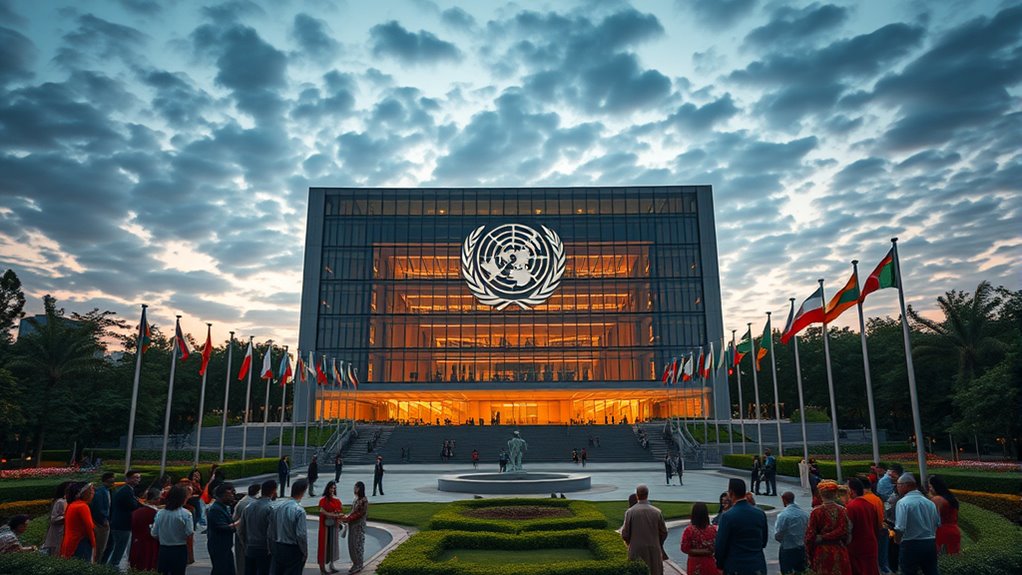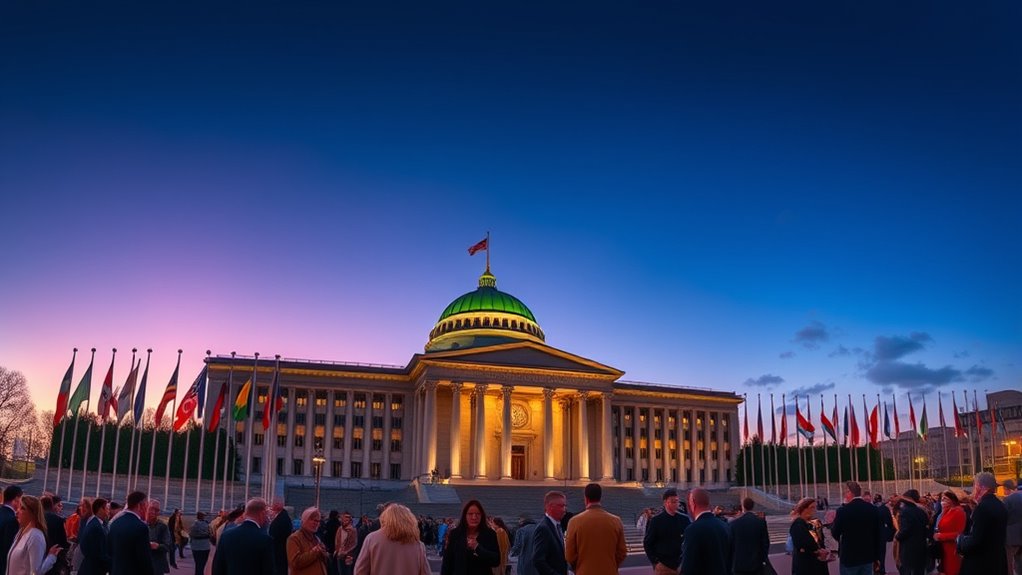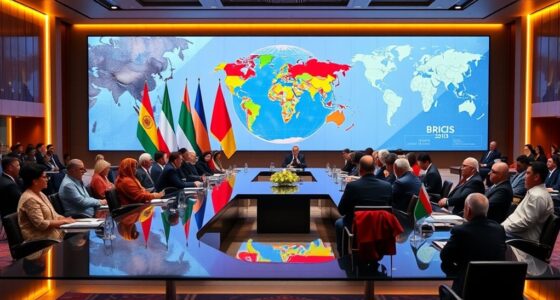As the United Nations marks 80 years, you can see it has achieved much in promoting peace and sustainable development through peacekeeping, conflict resolution, and global initiatives like the SDGs. Yet, challenges like ongoing conflicts, climate change, and political instability remain. While the UN’s efforts have made a difference, continued global cooperation is essential for future progress. Stay with us now to explore how the UN plans to overcome these hurdles and shape a better world ahead.
Key Takeaways
- The UN has played a pivotal role in mediating conflicts and maintaining peace through various peacekeeping missions.
- It has advanced sustainable development goals, promoting peace, equality, and environmental sustainability globally.
- Challenges include uneven progress toward SDGs, political instability, and the impacts of climate change.
- The organization continues to serve as a vital platform for international cooperation and dialogue.
- Renewed commitment and innovation are essential to overcome future obstacles and strengthen the UN’s mission.

Have you ever wondered how the United Nations has evolved over the past 80 years? Since its founding, the UN has played a pivotal role in shaping international cooperation, striving to promote global peace and sustainable development. When you look back, you’ll see that its core mission has remained consistent: preventing conflicts and fostering a world where people can live without fear of war. Over the decades, the UN has mediated countless conflicts, helped establish peacekeeping missions, and brought nations together in dialogue. These efforts are essential because they demonstrate a collective commitment to peace that transcends borders. Still, achieving global peace isn’t straightforward. You might notice that conflicts persist in various regions, often fueled by economic disparities, political tensions, or historical grievances. The UN continues to face challenges in resolving these deeply rooted issues but remains a critical platform for diplomatic solutions. Its peacekeeping operations, while sometimes criticized, have helped stabilize fragile regions and create space for political processes to take root.
At the same time, the UN has increasingly prioritized sustainable development, recognizing that peace and prosperity are interconnected. You can see this in initiatives like the Sustainable Development Goals (SDGs), which aim to address issues such as poverty, inequality, climate change, and access to quality education. These goals embody the idea that development should be inclusive and environmentally sustainable, ensuring future generations inherit a healthier, more equitable world. As you follow the UN’s efforts, you’ll notice that collaboration across nations is essential for tackling these complex challenges. Countries share knowledge, resources, and innovations to meet shared targets, illustrating the importance of multilateral cooperation.
Nevertheless, significant hurdles remain. You may observe that progress toward some SDGs is uneven, with conflicts, economic setbacks, or political instability hindering advancement. Climate change, in particular, poses a threat that no country can face alone. The UN’s role in coordinating global responses is more important than ever, urging nations to work together for a sustainable future. As the organization approaches its 80th anniversary, it’s clear that while remarkable achievements have been made in fostering peace and development, there’s still a long road ahead. The challenges ahead demand renewed commitment, innovative solutions, and stronger international solidarity. You can be part of this ongoing journey by staying informed and supporting efforts that promote cooperation, peace, and sustainable growth worldwide. The UN’s evolution reflects humanity’s collective desire for a better future—one where peace endures and sustainable development becomes a reality.
Frequently Asked Questions
How Has the Un’s Role Evolved in Global Conflicts?
You see the UN’s role in global conflicts evolve through increased peacekeeping missions and diplomatic negotiations. It now actively deploys peacekeepers to stabilize war zones and facilitates talks between conflicting parties. You notice how these efforts aim to prevent escalation and promote lasting solutions. Over time, the UN’s approach has become more strategic and responsive, emphasizing collaboration and diplomacy to address complex conflicts worldwide.
What Are the Un’s Main Financial Challenges Today?
You should know that the UN faces significant financial challenges today, largely due to funding disparities and issues with budget transparency. These disparities make it hard to allocate resources fairly, while lack of transparency can erode trust and hinder accountability. To guarantee effective operations, you need to support efforts to improve funding mechanisms and promote clearer financial practices within the organization.
How Does the UN Address Emerging Technological Threats?
You see the UN tackling emerging technological threats by strengthening cybersecurity measures, promoting international cooperation, and developing policies to manage artificial intelligence risks. It actively monitors cybersecurity threats, collaborates with member states to share intelligence, and updates guidelines to keep pace with evolving risks. The organization also invests in research and promotes ethical AI development, ensuring technology benefits humanity while minimizing dangers like cyberattacks and AI misuse.
What Reforms Are Proposed to Improve UN Effectiveness?
You can expect proposed reforms like Security Council reform to make decision-making more representative and transparent. Efforts focus on boosting Peacekeeping efficiency by streamlining operations and increasing accountability. These changes aim to address current shortcomings and enhance the UN’s effectiveness. By supporting these reforms, you help foster a more responsive and capable organization, better equipped to handle global crises and ensure lasting peace and security worldwide.
How Does the UN Ensure Inclusivity of All Member States?
You can see the UN promotes inclusivity through policies that encourage inclusive participation and guarantee equitable representation of all member states. It actively involves nations of varying sizes and regions in decision-making processes, giving everyone a voice. The UN also reforms its structures, like the Security Council, to better reflect global diversity, fostering a more equitable platform where all members can contribute meaningfully to international issues.
Conclusion
As you reflect on the UN’s 80 years, remember that over 193 countries collaborate to tackle global issues daily. Did you know that the UN’s peacekeeping missions have helped reduce conflict in many regions? While challenges remain, your awareness and support can make a difference. Together, you can contribute to building a more peaceful, equitable world—proving that even in 80 years, the UN’s impact is still growing and essential for our future.










